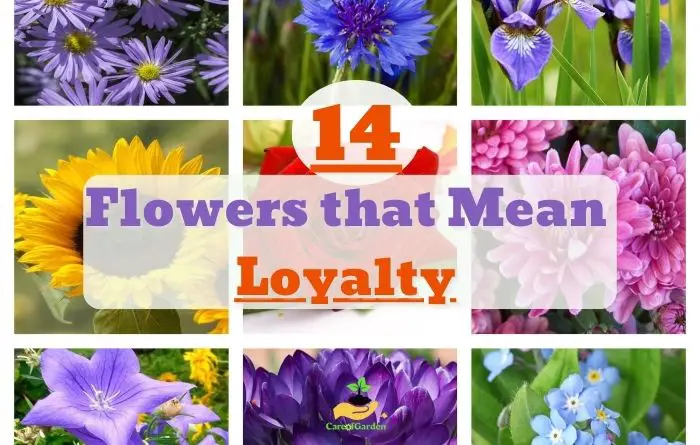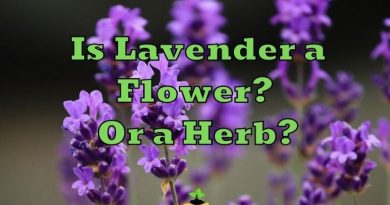14 Flowers That Mean Loyalty: Surprise Your Loved Ones!
When it comes to expressing our deepest emotions, flowers have been a timeless symbol of loyalty and devotion. These qualities lay the groundwork for enduring relationships, whether they are intimate friendships or love partnerships.
If you’re looking for a way to show your unwavering commitment to someone special, the language of flowers can help you do just that, and some flowers have a specific meaning when it comes to expressing loyalty and devotion.
In this article, we’ll look at 14 flowers—each with its own distinct beauty and charm—that stand for these timeless traits.
| Flower Name Representing Loyalty | Meaning | Bloom Season |
|---|---|---|
| Red Roses | Passionate love and unwavering devotion | Summer |
| Violet | Loyalty, faithfulness, and devotion | Spring, Summer |
| Aster | Trust, patience, and loyalty | Summer, Fall |
| Forget-Me-Not | True love and memories that last forever | Spring, Summer |
| Daisies | Faithfulness and loyalty | Spring, Summer, Fall |
| Cornflower | Devotion, loyalty, and true love | Summer |
| Bluebell | Everlasting love and constancy | Spring |
| Speedwell | Faithfulness, loyalty, and lasting affection | Spring, Summer |
| Yarrow | Everlasting love and commitment | Summer |
| Honeysuckle | Bonds of love, devotion, and fidelity | Summer, Fall |
| Iris | Faith, wisdom, and unswerving loyalty | Spring, Summer |
| Sunflower | Adoration, loyalty, and pure love | Summer, Fall |
| Chrysanthemum | Loyalty, trust, and lasting affection | Fall |
| Alstroemeria | Devotion, friendship, and strong bond | Summer, Fall |
1. Red Roses

Red roses are a well-known symbol of love and devotion and are frequently connected with passion and romance. According to popular belief, the deep, rich crimson hue of roses stands for the ferocity and depth of love as well as the tenacity and dedication of allegiance.
Especially on special events like Valentine’s Day, anniversaries, and weddings, red roses are presented as gifts to signify love in many cultures.
The ancient Greek and Roman cultures are where the red rose first became associated with love and fidelity. Aphrodite, the Greek goddess of love, is said to have created the rose as a representation of her love for her son Adonis.
The Romans celebrated Venus, the goddess of love, and utilized the rose as a symbol of their festivals. In Christian Europe throughout the Middle Ages, red roses were a common representation of adoration and devotion.
Red roses are still among the most often used flowers to symbolize devotion and love today. They are frequently used in marriage ceremonies, as romantic gestures, and as a means of devotion.
In literature and art, the red rose is frequently employed as a metaphor for the strength of love and the grace of fidelity.
2. Violet Flowers
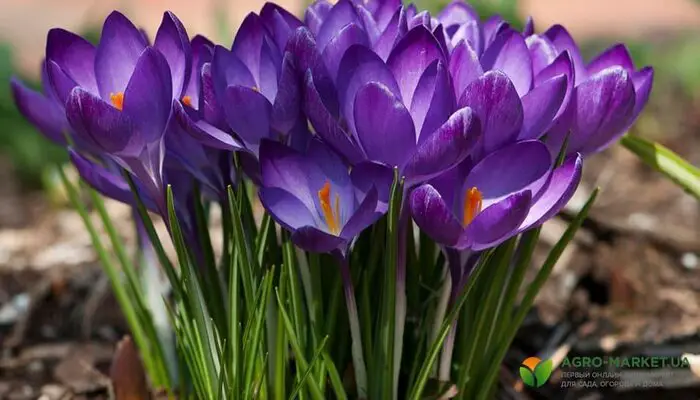
The majority of people adore this flower for both its appearance and its aroma. The violet blossom symbolizes love and loyalty. The silky blue and purple tones of the flowers, which fit their actual connotation of fidelity, make them appear small and almost modest.
Receiving a violet flower may also indicate that your speech is innocent and unpretentious, yet honest. This flower is an excellent choice for gardening and filling in tiny spaces since it not only looks great and is endless, but it is also simple to cultivate.
Violets have long been associated with loyalty, faithfulness, and devotion, making them a popular choice for wedding bouquets. The flower’s delicate beauty and sweet fragrance also symbolize the purity and innocence of true love. In some cultures, giving a violet to someone signifies a promise of loyalty and faithfulness.
They are often given as a gift to express love, loyalty, and appreciation, and they are also a popular choice for representing faithfulness and devotion.
3. Aster Flowers
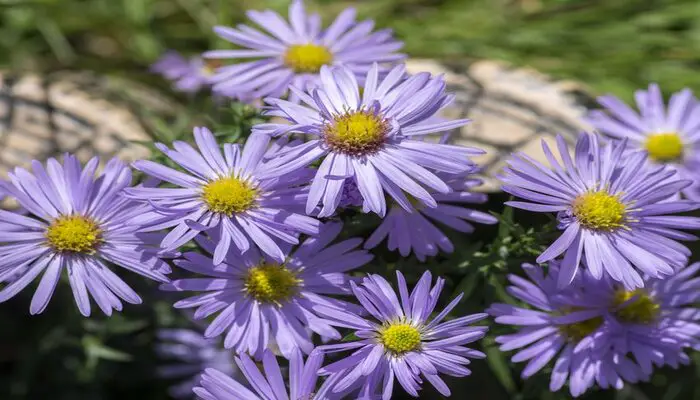
The aster most frequently represents belief, bravery, and understanding in the language of flowers, as well as loyalty and faithful love. Like many other flowers, asters have a number of symbolic meanings that change depending on the plant’s particular hue.
However, asters are frequently employed to represent universal concepts like elegance, daintiness, patience, and a love of novelty. They can also represent a yearning for things that were almost real.
The aster has a significant cultural legacy. Depending on the cultural perspective you are using to interpret it, its meaning differs.
For instance, the ancient Greeks used to burn aster plant leaves because they thought the smoke would keep off snakes and evil spirits. They also saw asters as a symbol of the god Jupiter.
According to a Greek myth, the goddess Astraea became so upset that she transformed into a star when Jupiter flooded the globe to drown the battling men. Astraea’s prayer was fulfilled by Jupiter, but she afterwards sobbed in sorrow. Her tears turned into stardust and where they landed, aster flowers appeared.
4. Forget-Me-Not
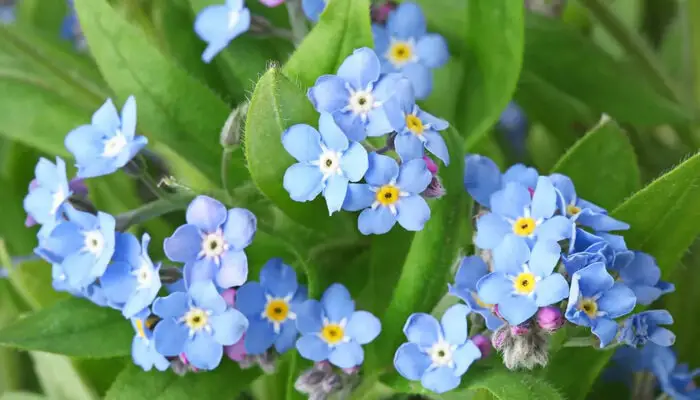
The lovely and fragile forget-me-not flower has long been linked to loyalty and love. The flower was given the name “forget-me-not” by a medieval knight who was gathering flowers with his lady love beside a river, according to folklore.
He stumbled and fell into the water as he grabbed for a lovely blue bloom. He shouted out “forget-me-not!” as he threw the flower to his lady just before being carried away by the river.
Ever since then, the forget-me-not has stood for enduring love and loyalty. It’s been claimed that the flower symbolizes the notion of “remember me forever” and is frequently presented as a gift to someone who is cherished and loved a great deal.
Forget-me-nots have a rich history and cultural significance. In medieval times, the flower was associated with the idea of chivalry, and knights would often wear forget-me-nots as a symbol of their loyalty and devotion.
Forget-me-nots typically bloom in the spring and summer, from April to June, and they are known for their small, five-petaled flowers that are usually blue, although they can also be pink or white. The flowers are often arranged in clusters, and they are known for their delicate, sweet fragrance.
5. Daisies
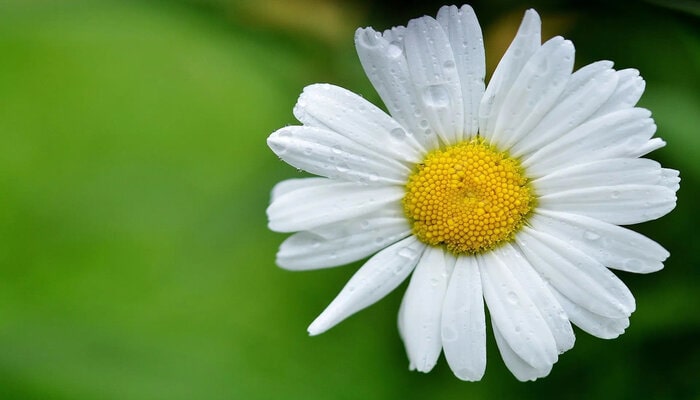
Daisies represent purity, faithfulness, and innocence. The idea of preserving a secret amongs friends is also claimed to be represented. The daisy is a cheery and enjoyable flower that is available in a variety of hues and sizes.
Almost 10% of all blooming plants on Earth, with the exception of Antarctica, are daisies. During the days of knights, suitors wore daisies, and ladies would put a daisy with their keepsakes to symbolize their availability.
Additionally, daisies have served as a universal symbol of faithfulness and devotion throughout history. Daisies are used in bridal bouquets in several cultures and are believed to offer the bride and husband luck.
Daisies are frequently offered as presents to mark the beginning of a new love partnership or to honor an enduring friendship. Overall, the daisy’s relationship with love and devotion is a result of its lasting qualities, purity, and innocence, as well as its use in many cultures as a sign of fidelity and commitment.
6. Cornflower
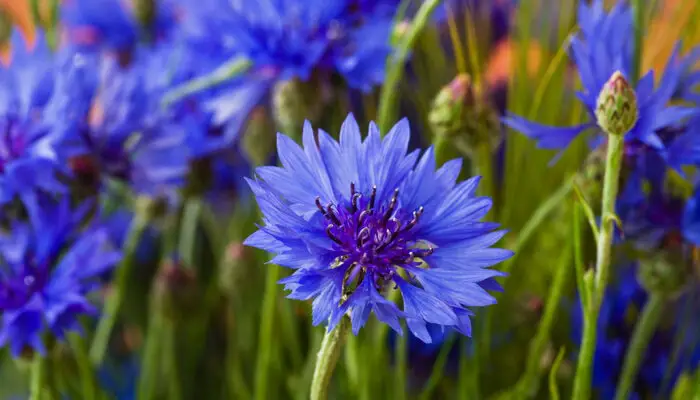
Cornflowers, also known as bachelor’s buttons, have various meanings depending on the culture and context.
The blue cornflower, which is only native to the edge of cornfields today , has always been considered the classic wild flower and has stood for the Romantic era since the 19th century.
It is a symbol of hope, stability, and endurance, which are all qualities that are often associated with loyalty. In addition, its blue color is also symbolic of trust and confidence, which are important aspects of loyalty.
The violet-blue color also earned her the trivial name “Cyane” and signals confidence. Unhappy lovers say with the cornflower “I will not give up hope!”. The blue cornflower symbolizes closeness to nature and loyalty. Their elongated bracts suggest delicacy.
7. Bluebells Flowers
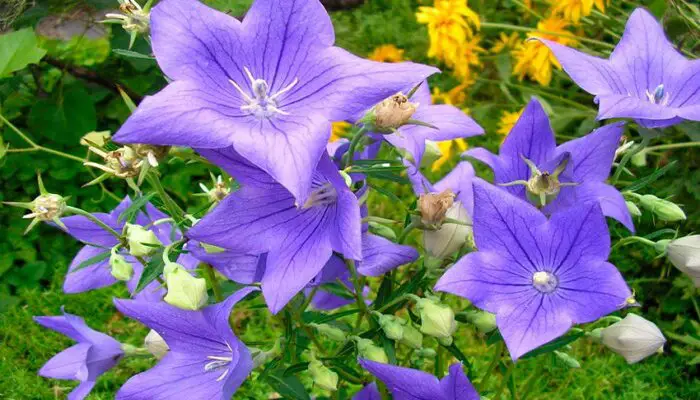
Since the 16th century, the blubelle has been the flower of prudence, and the symbol of the mercy of the Virgin. Then the enthusiasm it aroused in the 18th century made it the symbol of luxury. Today, the hyacinth expresses the joy of loving, fidelity, and is offered on all occasions.
Bluebells, also known as Hyacinthoides non-scripta, are a stunningly beautiful flower that is native to the forests of Western Europe. These delicate, bell-shaped blooms can range in color from deep violet-blue to pale pink or white. In many cultures, bluebells have come to symbolize humility and gratitude.
They are also associated with everlasting love and constancy, making them a popular choice for wedding bouquets and romantic gifts.
Bluebells are often planted in gardens and natural areas as they are a great attractor of pollinators such as bees and butterflies. They are also a favorite of gardeners due to their naturalizing ability and ability to thrive in shady areas.
8. Speedwell Flowers
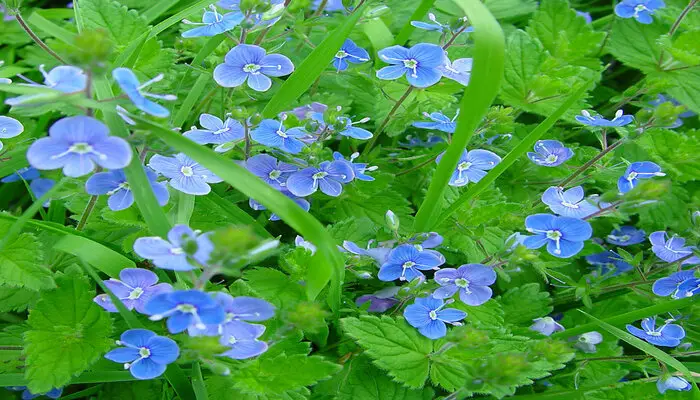
Speedwell, also known as Veronica, is a delicate flower that can be found in shades of blue, pink, and white. The flower symbolizes fidelity, loyalty, and everlasting love.
It is also associated with faithfulness and can be used to express the idea of staying true to one’s beliefs or principles. In addition, the Speedwell flower is believed to bring good luck and success in all endeavors.
The plant is also often associated with Christian faith themes and is a popular addition to many symbolic gardens.
Speedwell flowers come in various colors, including blue, pink, purple, and white, and are known for their long spikes of small petals 5. The plant is easy to grow and care for, making it a popular choice for gardens.
9. Yarrow Flowers
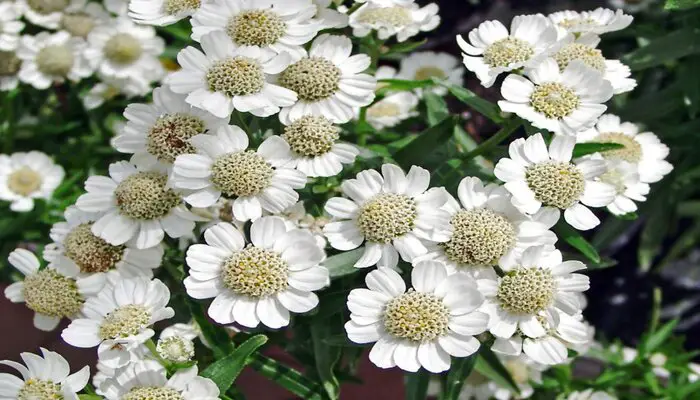
One of the oldest medicinal plants in the world, yarrow has been utilized since ancient times. Yarrow has enormous and steadfast affection, devotion, and protection for us, much like a close friend would.
It can be discovered in fields, parks, and even by the side of the road. Despite the fact that these blooms may be stunning on their own, they are frequently used in large bouquets and even as filler plants.
Yarrow is a robust perennial plant with a pleasant perfume that may be found in many locations that need a feeling of balance and health-giving.
10. Honeysuckle
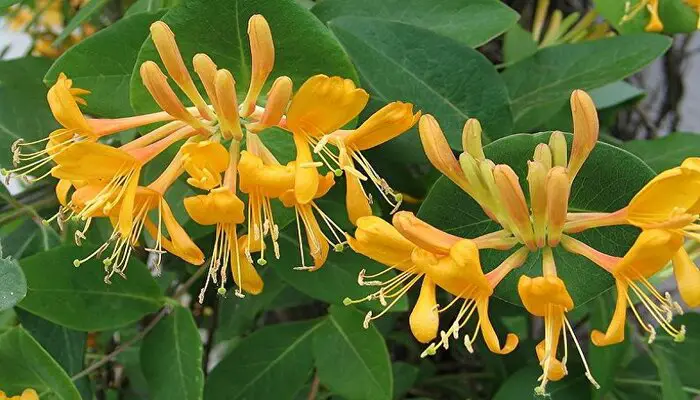
The honeysuckle blossom may be the ideal option if you’re wondering what flower denotes loyalty. Climbing honeysuckle has sweet yellow or white blossoms.
Petals have a somewhat pleasant taste and are safe for human consumption. Giving a partner a honeysuckle flower can occasionally signify a generous love. Honeysuckle fantasies are associated with hope in China. Victorian suitors would present flowers as a pledge of commitment.
In France, honeysuckle was symbolic of devotion, spirituality, love, and fidelity, and it played a significant role in superstition during the Victorian era of Great Britain.
The sweet fragrance of the honeysuckle flower is believed to represent the sweetness of love and the entwining vines of the plant are seen as a symbol of strong and unbreakable bonds.
Additionally, honeysuckle flowers are often given as gifts between lovers or as a sign of enduring love and commitment, further emphasizing the connection between honeysuckle and loyalty or fidelity.
11. Iris Flower
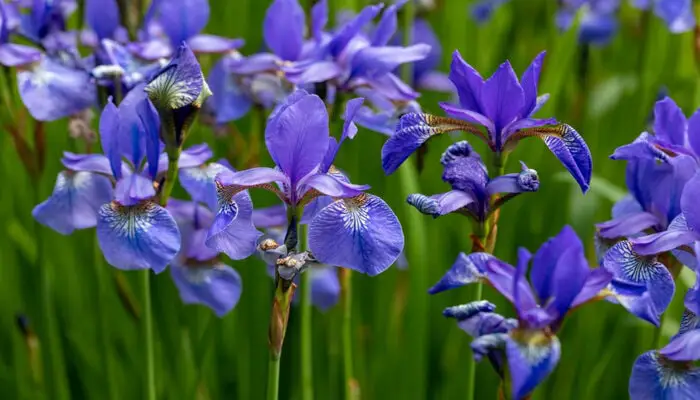
The iris is the ultimate sign of loyalty; with no other flower, you can express more clearly that you always want to stand by the recipient.
Irises are flowers that have been linked to devotion and love for a very long time. The goddess Iris represented the rainbow in Greek mythology and served as a conduit between the gods and mortals.
Her reputation for elegance, beauty, and fidelity led to the association of irises with these attributes. The word “iris” for the flower comes from the Greek word for “rainbow,” which further emphasizes its association with Iris and her vibrant radiance.
Irises have been utilized historically to express love and devotion, in addition to their mythological origins. Irises, for instance, were frequently presented as presents in Victorian England to show affection and gratitude.
It is a highly-liked option for bridal bouquets and other special events, as well as a heartfelt present for loved ones like friends and family.
Particularly, the purple iris was favored for conveying loyalty and adoration since it was frequently connected with monarchy and aristocracy. In addition, the iris has a lengthy blooming period that frequently extends from early spring to late summer.
This extended period of beauty and color is viewed as a metaphor of persistent devotion to fostering and maintaining a relationship through time, which is why it is said to symbolize enduring love and loyalty.
Overall, the iris is a flower that stands for beauty, grace, perseverance, as well as love and devotion.
12. Sunflower
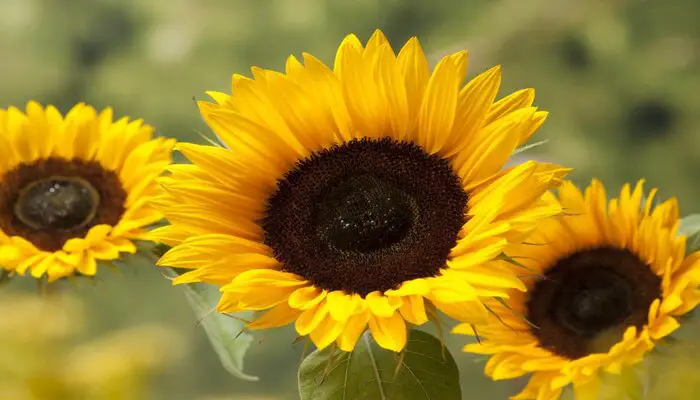
Sunflowers, or Helianthus annuus, are popular flowers known for their striking appearance and symbolism.
Sunflowers may stand for love and loyalty in addition to being typically associated with the sun and happiness. In terms of romantic relationships, this interpretation is especially pertinent. The flowers in orange or yellow tones also symbolize loyalty, energy, enthusiasm and warmth.
Sunflowers have a sturdy stem that enables them to stand upright and face the light, which is why they are sometimes equated with fidelity.
This trait is comparable to how individuals may continue to show their relationships their love and dedication despite difficulties in life. Furthermore, sunflowers are known to face the sun all day long, which is sometimes regarded as a sign of loyalty and enduring love.
13. Chrysanthemum
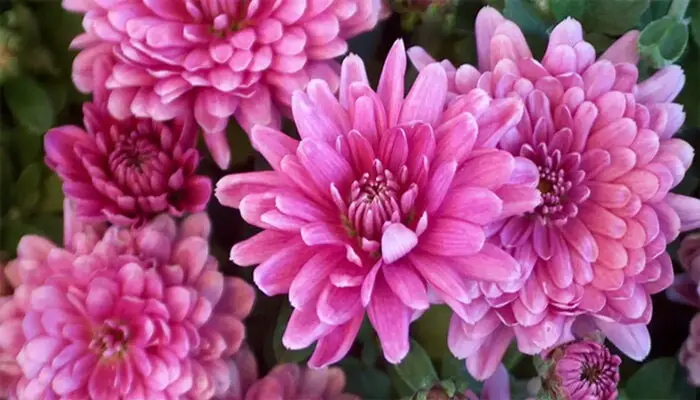
Particularly in Asian cultures, chrysanthemums are frequently connected with love and devotion. They stand for the sun, enduring power, and the emperor’s authority in Japan and are the emblem of the Imperial Family.
The “Festival of Happiness,” which takes place in the fall, honors the chrysanthemum as Japan’s national flower each year. Chrysanthemums are a symbol of autumn, the harvest, and long life in China.
They are frequently portrayed as a sign of tenacity and perseverance in works of art and poetry. Additionally connected to Taoism and the idea of immortality, the flower.
If you want to express a romantic feeling, choose red or white buds: the former symbolize love as such, while the latter symbolize loyalty and devotion.
14. Alstroemeria
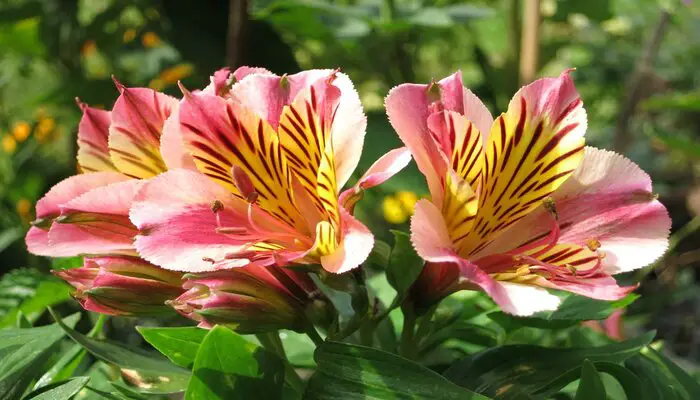
Alstroemeria, also known as Peruvian Lily, is a plant native to South America characterized since ancient times by a strong symbology. It was associated with a victory of good over evil, to date, this flower represents loyalty and devotion.
With colors ranging from yellow to bright red, it is utilized as an ornamental plant or to decorate gardens, or to enrich bouquets.
Alstroemeria is like a sophisticated woman, harmonious and joyful. Compositions with this flower symbolize fidelity and honesty. A pink bud emphasizes the youth and charm of the owner, a red bud is a manifestation of passion.
Frequently Asked Questions
Yes, flowers that symbolize loyalty can be given to both men and women. It is important to choose the appropriate color and arrangement based on the recipient’s preferences and the occasion.
Blue is the most common color associated with loyalty in flowers, as it represents trust and faithfulness. However, other colors such as yellow, white, and purple can also be used to symbolize loyalty depending on the flower.
Blue flowers that mean loyalty include the forget-me-not, bluebell, and delphinium. These flowers are often given as gifts to symbolize faithfulness, trust, and loyalty in relationships. The color blue is traditionally associated with these qualities, which is why blue flowers are commonly used to represent loyalty.

